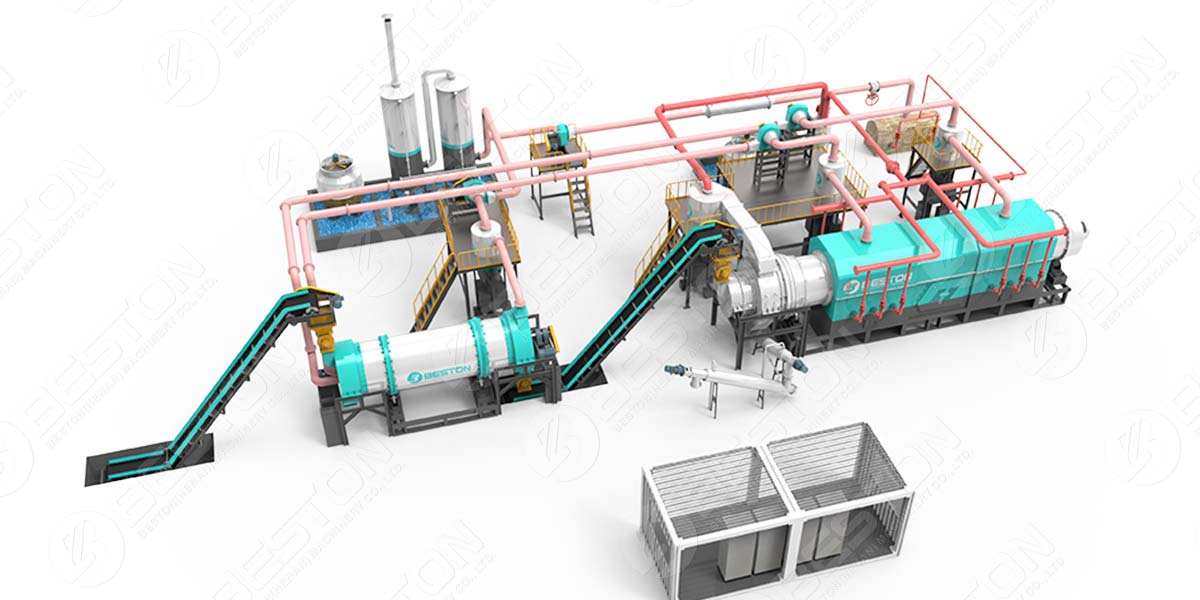In the realm of exotic fuels, coconut shell charcoal emerges as a unique and sustainable protagonist. Beyond the conventional sources, coconut shells, with their fibrous husks, undergo a metamorphosis that transcends the ordinary. Let’s delve into the depths of this artisanal craft, exploring the intricacies that make coconut shell charcoal a fascinating and eco-friendly fuel.
The Botanical Marvel: Coconut
A Bounty in a Nutshell: Coconut’s Rich Husk
The coconut, often praised for its culinary versatility and tropical allure, unveils another treasure within its husk—the coconut shell. Beyond its protective role for the seed, the husk is a fibrous reservoir waiting to be transformed into something extraordinary. The coconut shell charcoal making machine can make high-quality charcoal.

Fibrous Alchemy: From Husk to Charcoal
The process of turning coconut husks into charcoal involves a delicate dance of heat and pyrolysis. The fibrous nature of the husk makes it an ideal candidate for this transformation, resulting in a charcoal with unique properties that distinguish it from more conventional counterparts.
Crafting Coconut Shell Charcoal: The Alchemical Process
Pyrolytic Symphony: The Essence of the Craft
Within the controlled confines of a kiln, the coconut shells embark on a pyrolytic symphony. Heat, carefully calibrated, initiates a transformative dance where volatile compounds are expelled, leaving behind a carbon-rich residue—the essence of coconut shell charcoal. This meticulous process elevates the craft to an art form. More information on biochar machine.
Artisanal Touch: Traditional vs. Modern Techniques
In the world of coconut shell charcoal, the choice between traditional and modern techniques adds another layer to the narrative. Traditional methods, with open pits and slow pyrolysis, impart a smoky richness to the charcoal. On the other end, modern retorts and continuous pyrolysis systems add efficiency and precision, striking a balance between tradition and innovation.
The Distinct Charms of Coconut Shell Charcoal
Mesmerizing Aromas: The Fragrance of the Tropics
As the coconut shells undergo pyrolysis, they release a fragrance that encapsulates the essence of the tropics. Unlike other charcoals, the aromas from coconut shell charcoal carry a distinct sweet and nutty undertone, adding a layer of sensory delight to its application.
Exotic Appearance: A Visual Feast
Beyond aroma, the visual allure of coconut shell charcoal is captivating. The charcoal, with its porous structure and irregular shapes, resembles a mosaic of nature’s artistry. The visual feast it presents adds a touch of exotic elegance to grilling or any application where it finds purpose. See sawdust charcoal making machine here.
Practical Marvels: The Versatility of Coconut Shell Charcoal
Superior Heat: The Thermal Edge
One of the remarkable qualities of coconut shell charcoal lies in its ability to reach higher temperatures compared to traditional wood charcoal. The superior heat it generates makes it a favorite among grilling aficionados and professional chefs seeking precision in their culinary endeavors.
Prolonged Burn: Sustained Elegance
The dense nature of coconut shell charcoal contributes to a prolonged burn. This sustained elegance not only enhances its efficiency as a fuel source but also makes it an economical choice for those who value longevity in their charcoal’s performance.
Environmental Stewardship: The Green Halo of Coconut Shell Charcoal
Renewable Radiance: Harnessing Waste
An environmental steward in its own right, coconut shell charcoal thrives on harnessing waste. Utilizing coconut husks that would otherwise be discarded as agricultural byproducts, this charcoal embodies the principles of sustainability, turning what might be considered waste into a valuable resource.
Carbon-Neutral Legacy: A Green Footprint
The carbon-neutral legacy of coconut shell charcoal adds to its green halo. When used responsibly and sustainably, it contributes to a carbon-neutral cycle. As the coconut trees absorb carbon dioxide during their growth, the released carbon during combustion becomes part of a closed-loop, minimizing environmental impact.
Conclusion: The Allure of Coconut Shell Charcoal
In the tapestry of exotic fuels, coconut shell charcoal weaves a narrative that is both practical and poetic. From its botanical origins within the coconut husk to the artisanal processes that transform it, every facet of this charcoal reflects a commitment to quality and sustainability. As it finds its place in grills, kitchens, and beyond, coconut shell charcoal stands not just as a fuel but as an embodimet of a harmonious relationship between nature, craftsmanship, and culinary excellence. Check the Beston Group here.